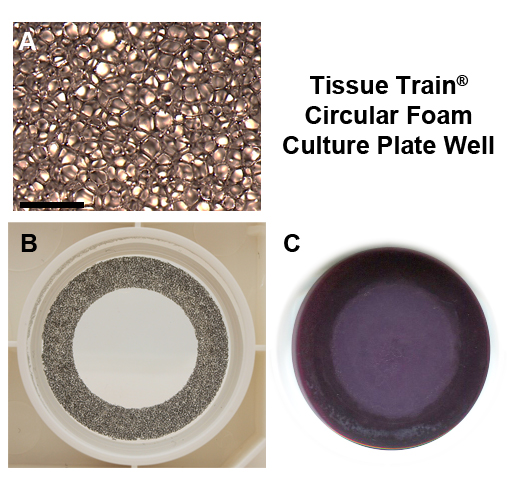Description
Thank you for your interest in flexercell products
Bio Excellence international Tech Co.,Ltd has been acting as sole agent for the sale of flexercell products for more than ten years,Bio Excellence can provide free technical guidance for flexercell tension, compression, fluid shear products, user site installation as well as training, until the user can use them without limng number of training times.If you have any questions, please do not hesitate to contact us.
flexercell tension culture system

flexercell® Tension Systems are patented, computer-regulated bioreactors that apply cyclic or static strain to cells cultured in vitro.
We designed flexercell® Tension Systems to help investigators analyze biochemical changes in response to tensile load on a variety of cell culture applications, including muscle, lung, heart, vascular vessels, skin, tendon, ligament, cartilage, and bone.
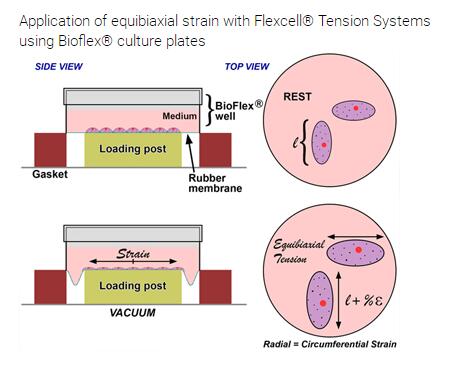
Application of Uniaxial strain with flexercell® Tension Systems using uniflex® culture plates
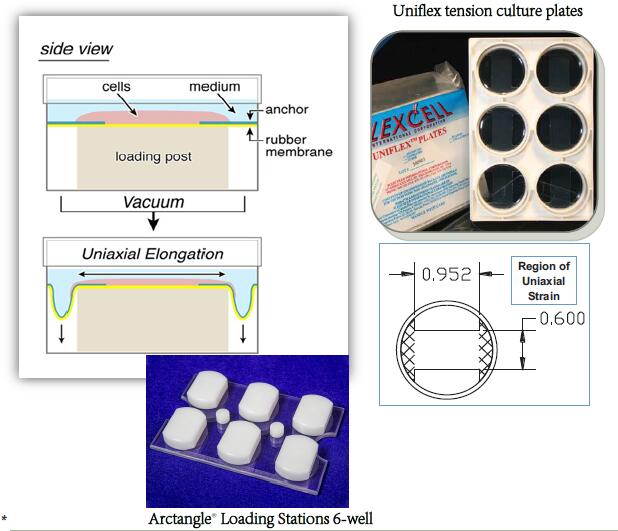
Our Tension Systems work with UniFlex® (Uniaxial strain), BioFlex®(Equibiaxial strain), HT BioFlex® (Equibiaxial strain), Tissue Train® (3D strain) and CellSoft® BioFlex® culture plates.
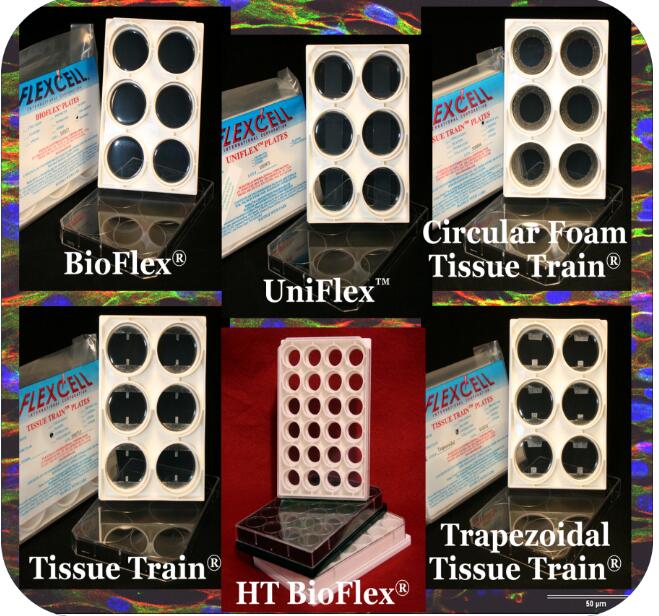
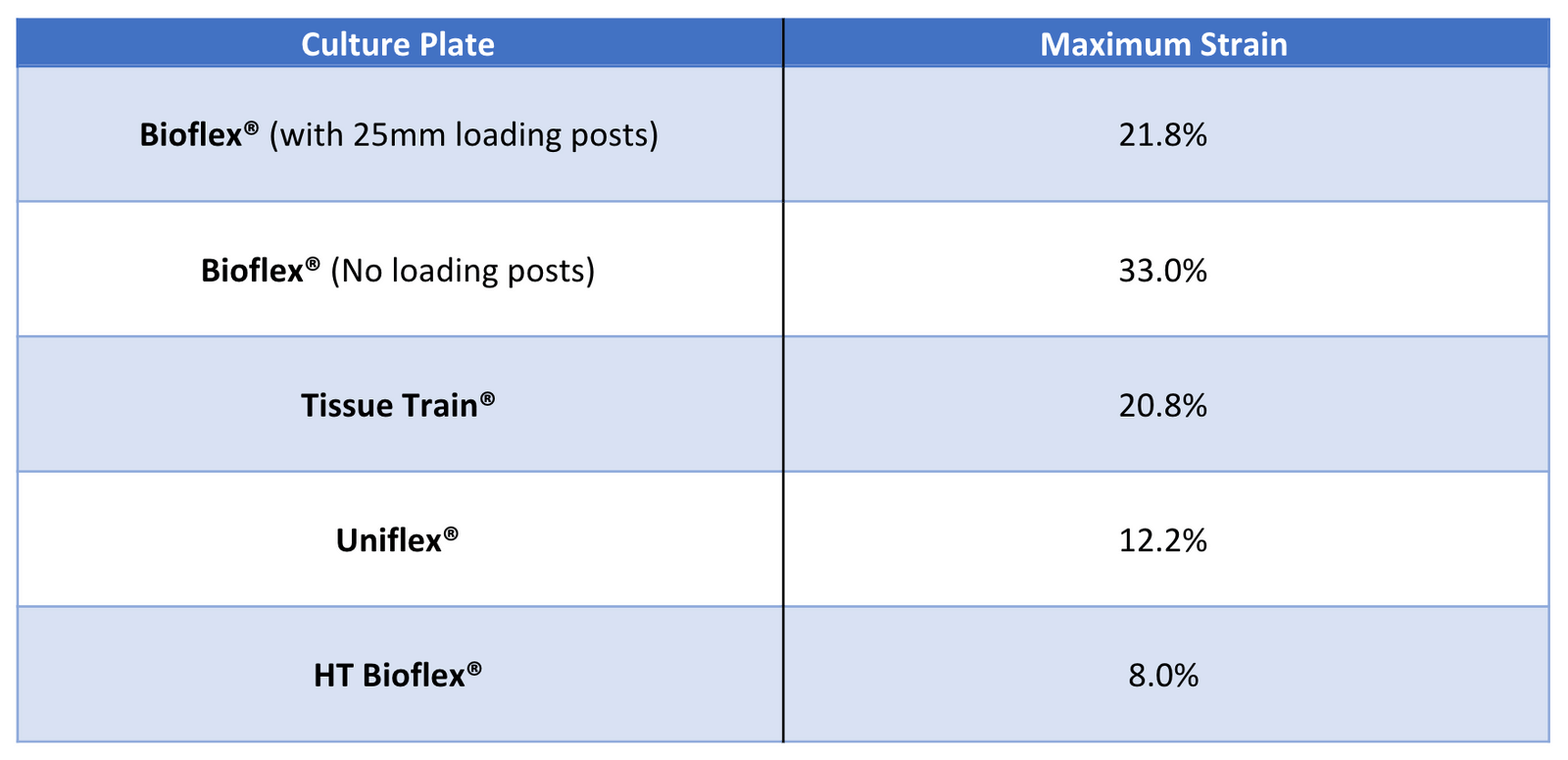
BioFlex® Culture Plates>>More
used with the flexercell Tension system for providing equibiaxial strain to cells in monolayer culture
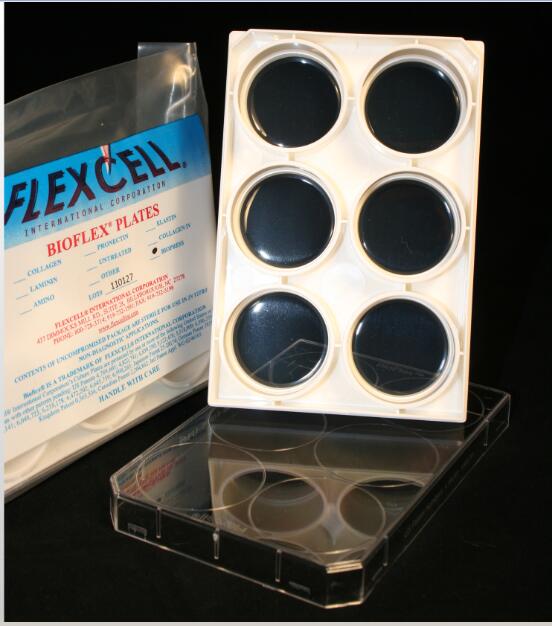
Flexible-bottomed culture plates that work with the flexercell® Tension System to provide a mechanical load regimen to cells in monolayer (2D).
-
6-well culture plate with total growth surface area of 57.75 cm2 (or 9.62 cm2/well)
-
Rubber membranes are optically clear for direct viewing of cells with an inverted or upright microscope
-
Covalently bonded matrix surfaces: Amino, Collagen (Type I or IV), Elastin, Pronectin® (RGD), and Laminin (YIGSR)
Item Description
BF-3001U BioFlex Culture Plate --Untreated
BF-3001A BioFlex Culture Plate --Amino
BF-3001C BioFlex Culture Plate --Collagen Type I
BF-3001C(IV) BioFlex Culture Plate --Collagen Type IV
BF-3001E BioFlex Culture Plate --Elastin
BF-3001P BioFlex Culture Plate --ProNectin
BF-3001L BioFlex Culture Plate --Laminin
-
Comes with untreated surface for those labs that want to use their own ECM coating protocol
-
Available individually or in case quantity of 40 plates
Applications of BioFlex® Culture Plates
-
Mechanical Load - use with flexercell® Tension System to research the effects of equibiaxial tensile strain on cells in vitro
-
Softer Substrate - provides a softer substrate for cell growth (when compared to standard plastic culture dishes) which better mimics in situ condons for some cell types like trabecular meshwork cells (see Aga et al. Invest Ophthalmol Vis Sci 55(9):5497-509, 2014)
-
Lung Injury Models - Used to understand the impact of ARDS, COPD, COVID-19 related pulmonary injuries by simulating "cytokine storm", hyper-tension and hyperventilation to cells in vitro (See Huang et al., Am J Respir Crit Care Med., 195(5):639-65, 2017; Ke et al.,Mol iol Cell.30(8): 959–974
-
Traumatic Brain Injury - - can be used in studies looking at traumatic injury in astrocytes and neurons, where the injury is produced with a Cell Injury Controller that controls a burst of gas which deforms the BioFlex® membrane creating large biaxial strains (see Ellis et al. J Neurotrauma 12 325–339, 1995; Ahmed et al. J Neurochem 74(5):1951-1960, 2000; Augustine et al. Neuroscience 274:1-10, 2014)
UioFlex® Culture Plates>>More
used with the flexercell Tension system for providing uniaxial strain to cells in monolayer culture
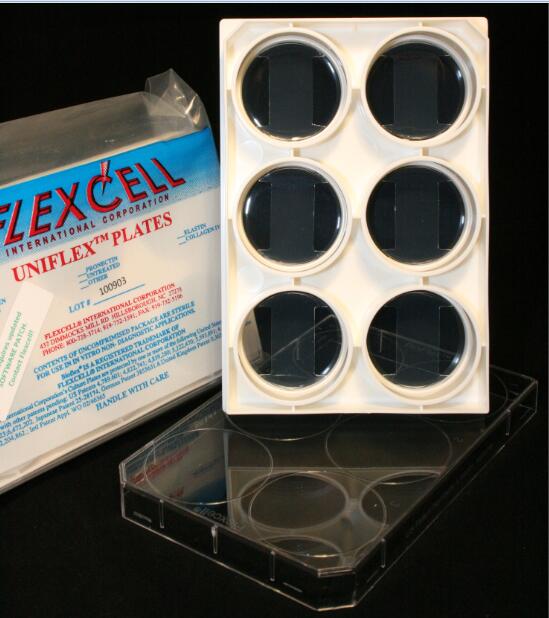
Flexible-bottomed culture plates that work with the flexercell® Tension System to provide uniaxial strain to cells in vitro.
-
Uniaxial strain field represented by a 0.6" wide x 0.952" (3.68 cm2) long centrally located rectangular region of membrane
-
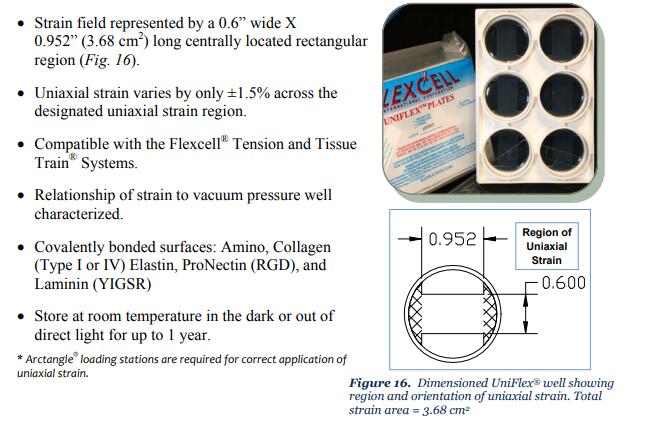
-
Arctangle® Loading Stations® are required for correct application of uniaxial strain
-
Covalently bonded matrix surfaces: Untreated, Amino, Collagen (Type I or IV), Elastin, Pronectin® (RGD), and Laminin (YIGSR)
Item Description
UF-4001U UniFlex Culture Plate --Untreated
UF-4001A UniFlex Culture Plate --Amino
UF-4001C UniFlex Culture Plate --Collagen Type I
UF-4001C(IV) UniFlex Culture Plate --Collagen Type IV
UF-4001E UniFlex Culture Plate --Elastin
UF-4001P UniFlex Culture Plate --ProNectin
UF-4001L UniFlex Culture Plate --Laminin
-
Comes with untreated surface for those labs that want to use their own ECM coating protocol
-
Available individually or in case quantity of 40 plates
HT BioFlex® Culture Plates>>More
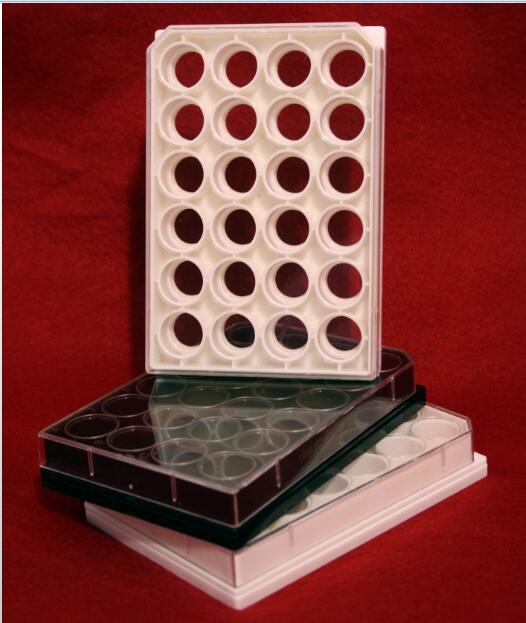
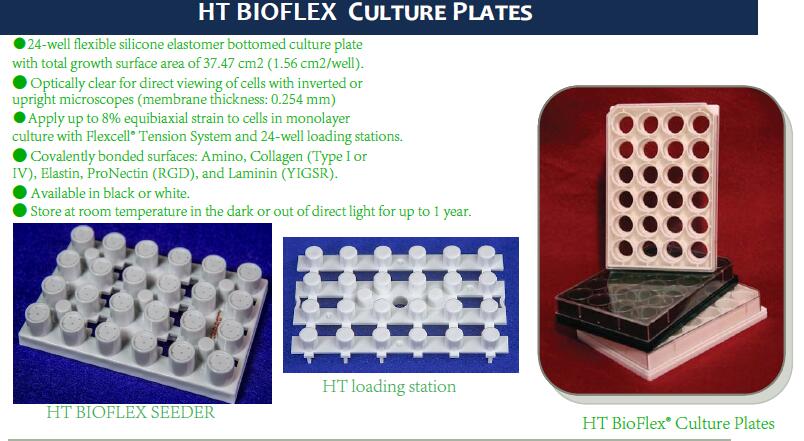
High throughput flexible-bottomed culture plates used with flexercell® Tension Systems to apply up to 8% equibiaxial strain to cells in monolayer culture.
-
24-well culture plate with total growth surface area of 37.47 cm2
-
Strain is applied to cells grown on the flexible membrane of 24-well plate in the same manner as with cells grown on 6-well BioFlex® culture plates.
-
Covalently bonded matrix surfaces: Untreated, Amino, Collagen (Type I or IV), Elastin, Pronectin® (RGD), and Laminin (YIGSR)
-
Available in black or white
Cat No Description
HTPW-3001U White HT BioFlex Culture Plate --Untreated
HTPW-3001A White HT BioFlex Culture Plate --Amino
HTPW-3001C White HT BioFlex Culture Plate --Collagen Type I
HTPW-3001C(IV) White HT BioFlex Culture Plate --Collagen Type IV
HTPW-3001E White HT BioFlex Culture Plate --Elastin
HTPW-3001P White HT BioFlex Culture Plate --ProNectin
HTPW-3001L White HT BioFlex Culture Plate --Laminin
Black:
HTPB-3001U Black HT BioFlex Culture Plate --Untreated
HTPB-3001A Black HT BioFlex Culture Plate --Amino
HTPB-3001C Black HT BioFlex Culture Plate --Collagen Type I
HTPB-3001C(IV) Black HT BioFlex Culture Plate --Collagen Type IV
HTPB-3001E Black HT BioFlex Culture Plate --Elastin
HTPB-3001P Black HT BioFlex Culture Plate --ProNectin
HTPB-3001L Black HT BioFlex Culture Plate --Laminin
-
Plates compatible with the 24-well HT baseplate and gats. Plates do NOT fit in the standard BioFlex® baseplate and gats
-
Available individually or case quantity of 40 plates
CellSoft®-Adjustable substrate stiffness stretch system
Why use CellSoft® soft substrates:
*Match in vitro substrate to native stiffness
*Reduce ”substrate shock“ to cells
* Retain cell stemness longer
Growing cells on soft substrates
influences cellmorphology,gene expression and stem cell differentiation.
Therapeutic applications of stem cells require control over their differentiation. With CellSoft® Soft Substrate culture plates, researchers can match the in vivo surface to native tissue stiffnesses.
CellSoft® is a specialized gel coating added to either elastomer membrane or polystyrene surfaces. CellSoft® substrates are "softer" and more stretchable compared to uncoated glass or polystyrene culture plates.
stretchable Flexible-bottomed culture plates cellsoft bioflex
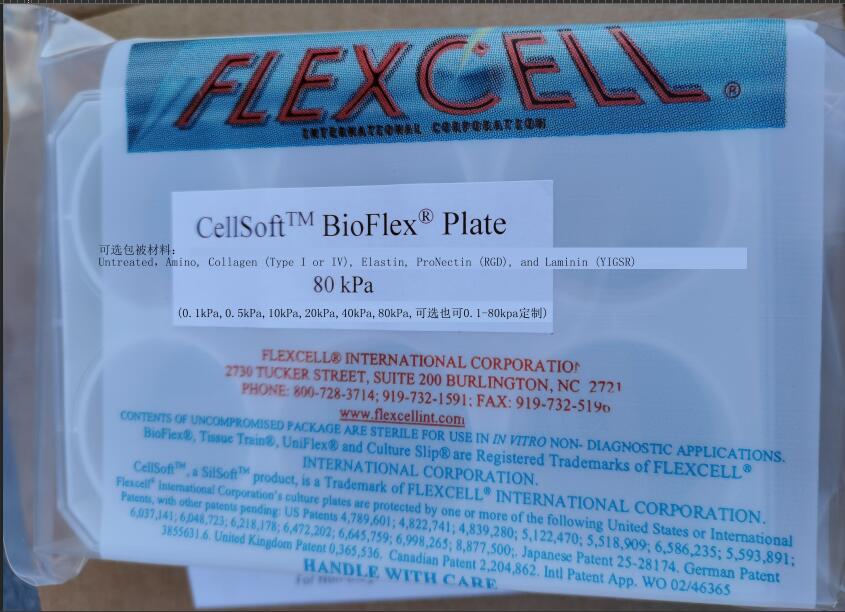
CellSoft® BioFlex® 6-well or 24 well flexible culture plates to stretch cells on soft substrates
Moduli range: 0.1, 5, 10, 20, 40, 200 kPa ,Can be customized as required
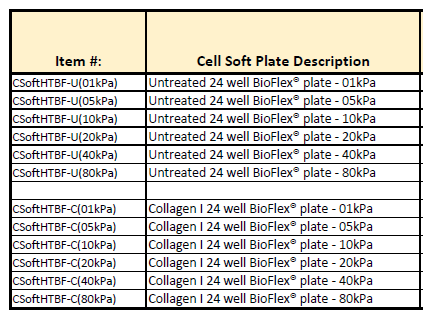
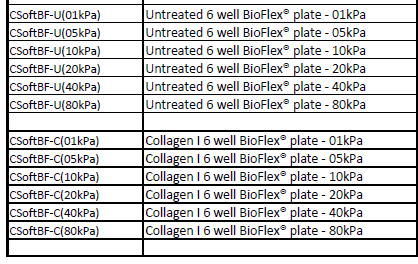
flexercell 3D TENSION SYSTEM-tissue train 3D culture system
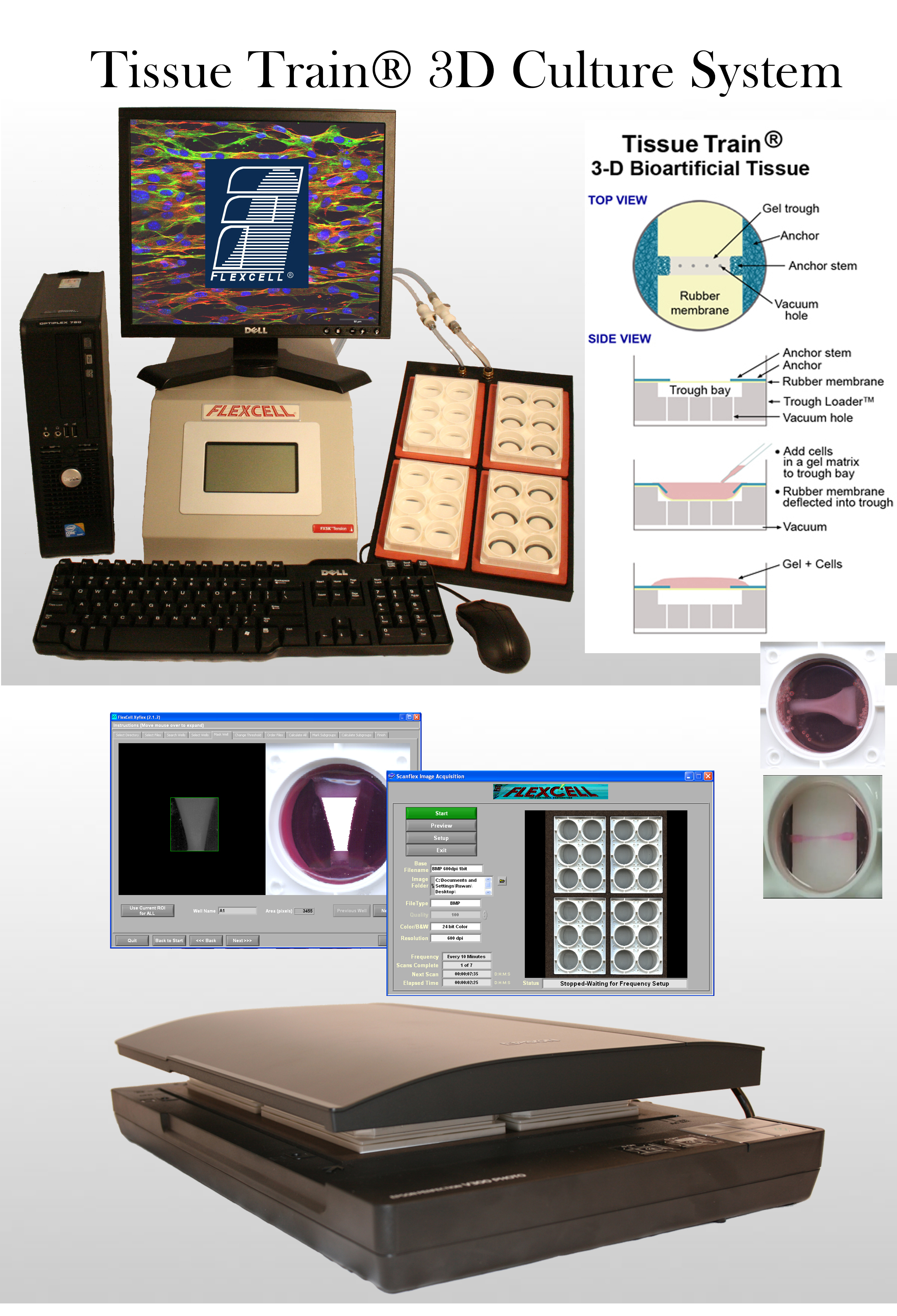
Circular Foam Tissue Train® Culture Plate>>More
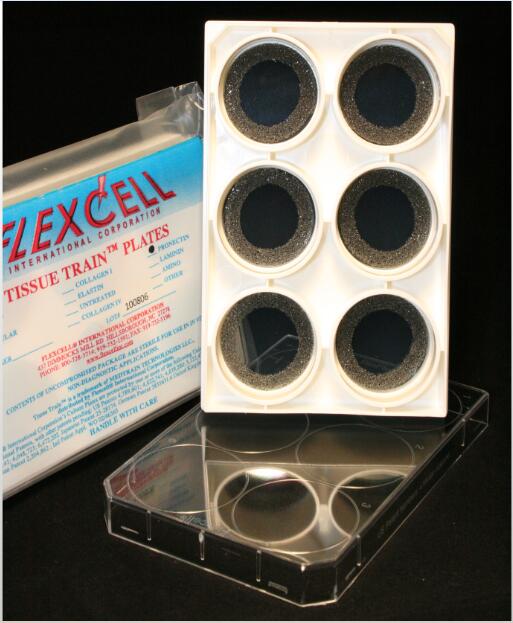
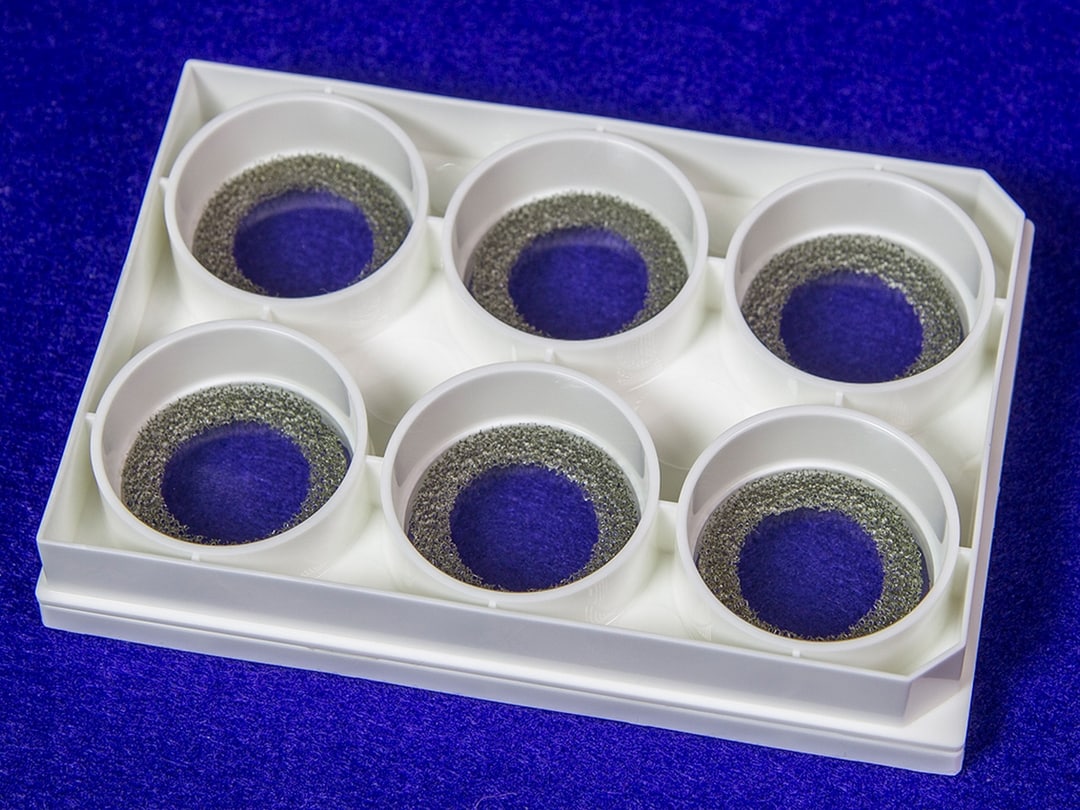
Create circular 3D cell-seeded gel constructs, while applying a load regimen of equibiaxial cyclic strain using the flexercell® FX-6000 Tension System.
-
Matrix bonded foam anchors for improved cell attachment
-
Monitor changes in cell shape, tissue organziation, cell migration, division, gene expression, protein secretion and expression
-
Covalently bonded matrix: Untreated, Amino, Collagen (Type I, IV), Elastin, Pronectin (RGD), and Laminin (YISGR)
Cat No Description
TTCF-4001U Circular Foam Culture Plate --Untreated
TTCF-4001A Circular Foam Culture Plate --Amino
TTCF-4001C Circular Foam Culture Plate --Collagen Type I
TTCF-4001C(IV) Circular Foam Culture Plate --Collagen Type IV
TTCF-4001E Circular Foam Culture Plate --Elastin
TTCF-4001P Circular Foam Culture Plate --ProNectin
TTCF-4001L Circular Foam Culture Plate --Laminin
-
Available individually or in case quantity of 40 plates
A) Close-up of open cell foam Bar = 1 mm B) Top view of a well in a 6-well Tissue Train® Circular Foam Culture Plate C) Top view of a well with Collagel® matrix solution attached to the foam ring
Linear Tissue Train® Culture Plate >>More
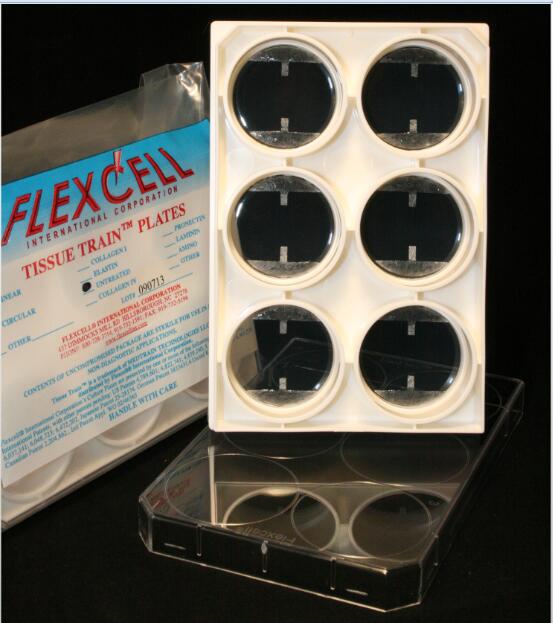
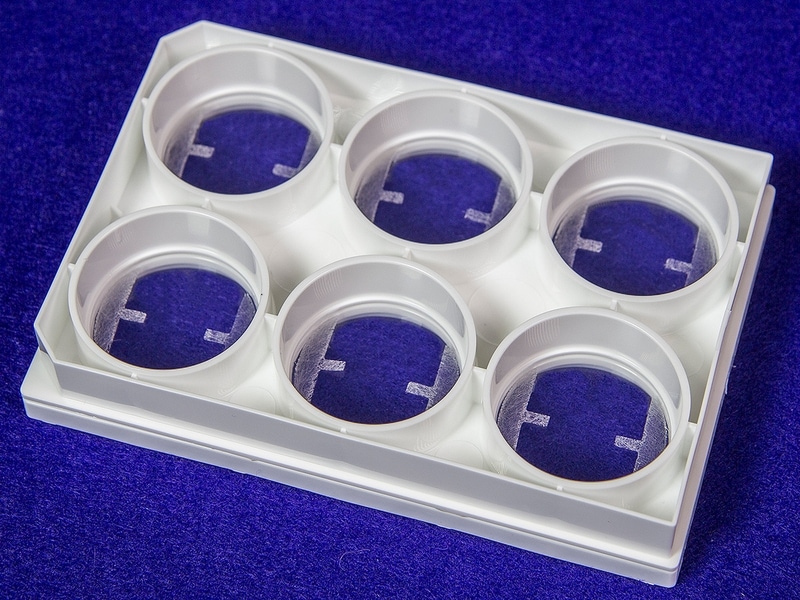
Works with the Tissue Train® System to create linear, tethered 3D cell-seeded gel constructs and to provide uniaxial cyclic strain to cells in a gel matrix.
-
Apply a load regimen of uniaxial cyclic strain to the 3D cell-seeded gel using Artangle® loading stations and the flexercell® Tissue Train® System
-
Mix preferred cell type in 3D collagen gel using a novel Trough Loader mold device
-
Available in matrix bonded cerex nylon mesh or urethane polyester foam anchor tabs for improved cell attachment
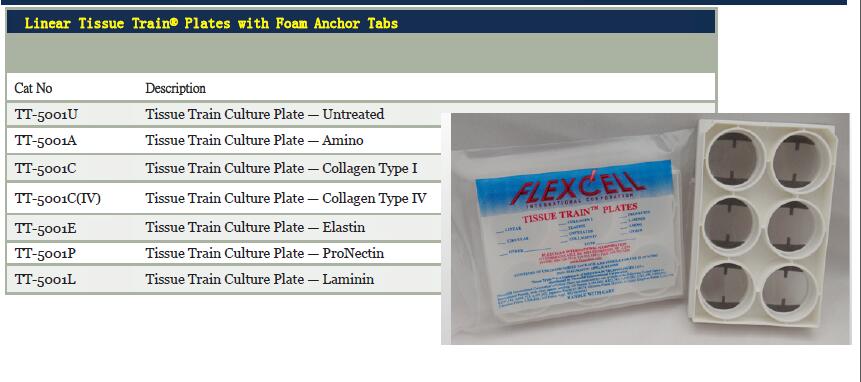
Cat No Description
TT-5001U Tissue Train Culture Plate --Untreated
TT-5001A Tissue Train Culture Plate --Amino
TT-5001C Tissue Train Culture Plate --Collagen Type I
TT-5001C(IV) Tissue Train Culture Plate --Collagen Type IV
TT-5001E Tissue Train Culture Plate --Elastin
TT-5001P Tissue Train Culture Plate --ProNectin
TT-5001L Tissue Train Culture Plate --Laminin
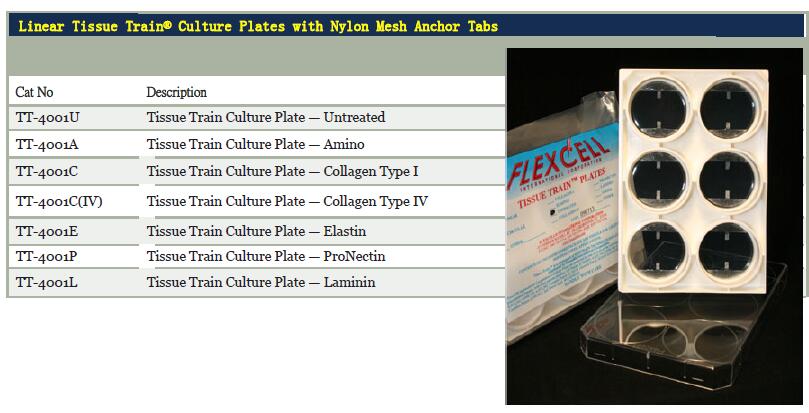
Cat No Description
TT-4001U Tissue Train Culture Plate --Untreated
TT-4001A Tissue Train Culture Plate --Amino
TT-4001C Tissue Train Culture Plate --Collagen Type I
TT-4001C(IV) Tissue Train Culture Plate --Collagen Type IV
TT-4001E Tissue Train Culture Plate --Elastin
TT-4001P Tissue Train Culture Plate --ProNectin
TT-4001L Tissue Train Culture Plate --Laminin
Works with the Linear Trough Loaders 6-well and Arctangle® Loading Stations 6-well:
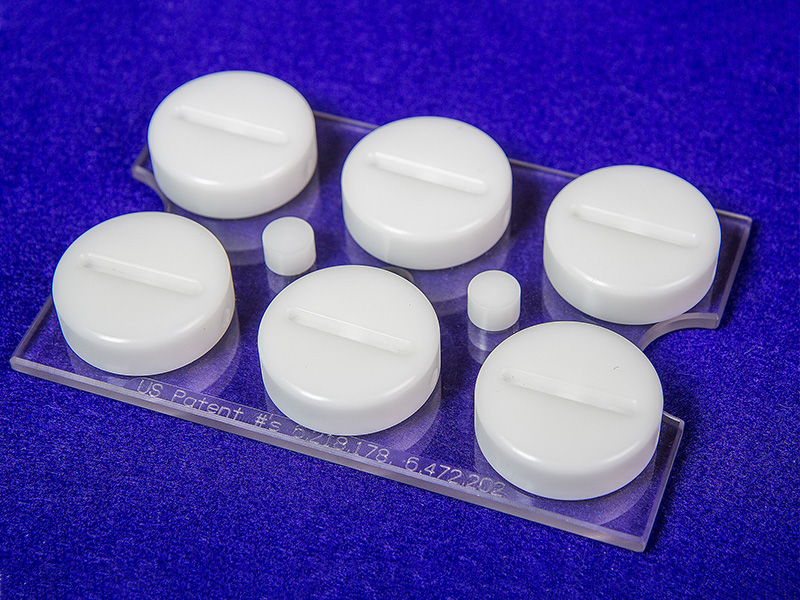
Figure Linear Trough Loaders 6-well
Molds for creating various shaped 3D cellseeded gel constructs with the Tissue
Train® Culture System .
Comprised of a Lexan plate with 6 individual, removable posts.
Available in linear and trapezoidal shaped molds.
Available in a set of four or as part of a baseplate kit.
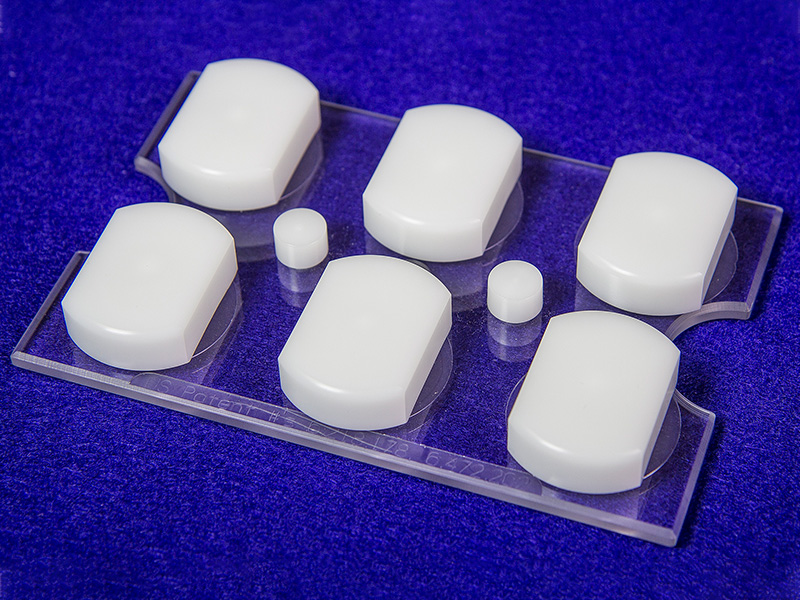
Figure Arctangle® Loading Stations 6-well
-
Packaged individually or in case quantity of 40 plates
Trapezoidal Tissue Train® Culture Plate>>More
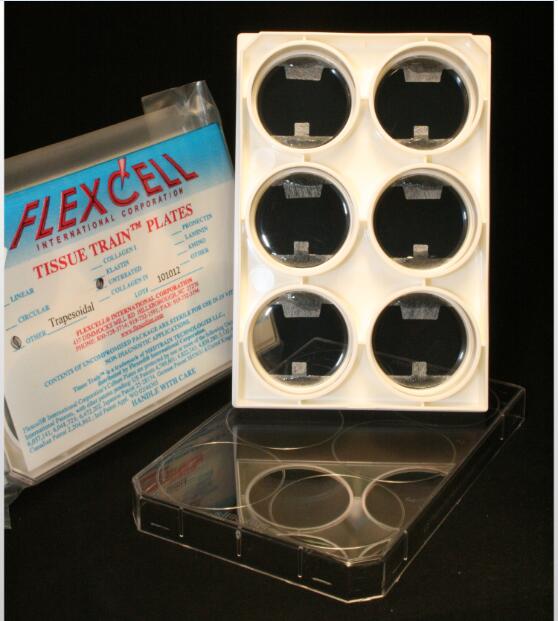
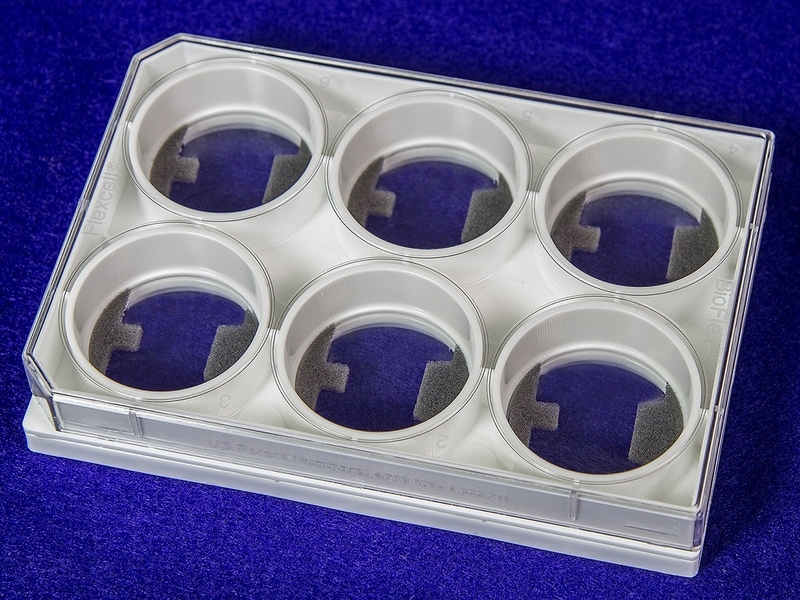
Works with the Tissue Train® System to create 3D trapezoidal-shaped bioartificial tissue constructs.
-
Create 3D collagen gel constructs using a Trapezodial Trough Loader® as a mold device
-
Apply a load regimen of uniaxial cyclic strain to the 3D cell-seeded gel using the flexercell® Tissue Train® System
-
Matrix bonded nylon mesh or foam anchors for improved cell attachment
-
Available individually or case quantity of 40 plates
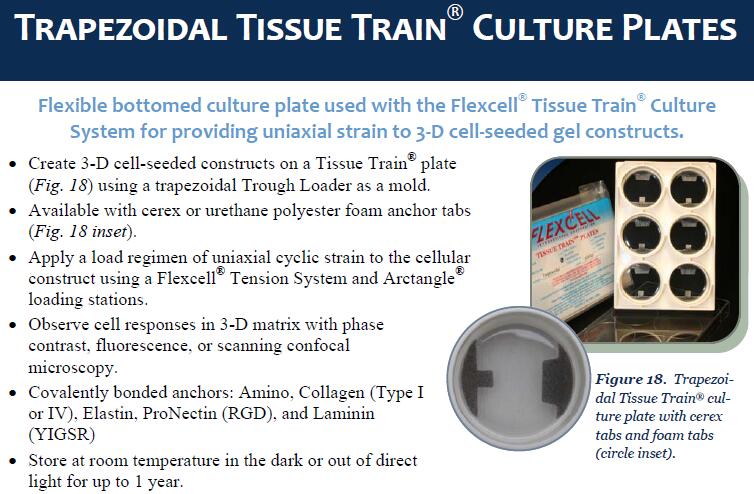
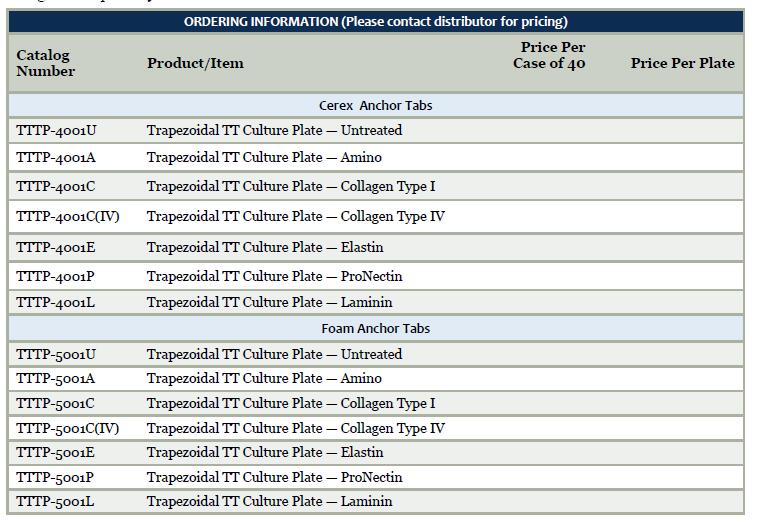
TTTP-4001U Trapezoidal TT Culture Plate --Untreated
TTTP-4001A Trapezoidal TT Culture Plate --Amino
TTTP-4001C Trapezoidal TT Culture Plate --Collagen Type I
TTTP-4001C(IV) Trapezoidal TT Culture Plate --Collagen Type IV
TTTP-4001E Trapezoidal TT Culture Plate --Elastin
TTTP-4001P Trapezoidal TT Culture Plate --ProNectin
TTTP-4001L Trapezoidal TT Culture Plate --Laminin
TTTP-5001U Trapezoidal TT Culture Plate --Untreated
TTTP-5001A Trapezoidal TT Culture Plate --Amino
TTTP-5001C Trapezoidal TT Culture Plate --Collagen Type I
TTTP-5001C(IV) Trapezoidal TT Culture Plate --Collagen Type IV
TTTP-5001E Trapezoidal TT Culture Plate --Elastin
TTTP-4001P Trapezoidal TT Culture Plate --ProNectin
TTTP-5001L Trapezoidal TT Culture Plate --Laminin
Cell stretch system under microscope
---flexercell tension Microscopy Devices
Real-time observation of cell stretching on a microscope stage
Bioexcellence has been selling the full flexercell's product as an sole agent,
flexercell tension Microscopy Devices have two types: StageFlexer® and Inverted StageFlexer®.
1.The StageFlexer® for Upright microscope
Single-well devices designed to allow the user to observe signaling responses to strain in real time on a Upright microscope stage
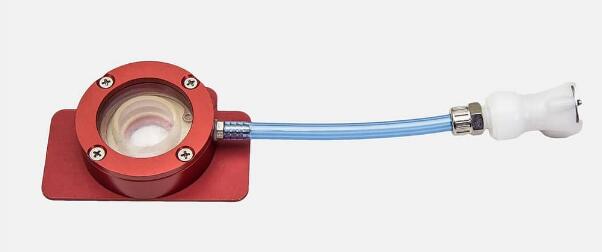
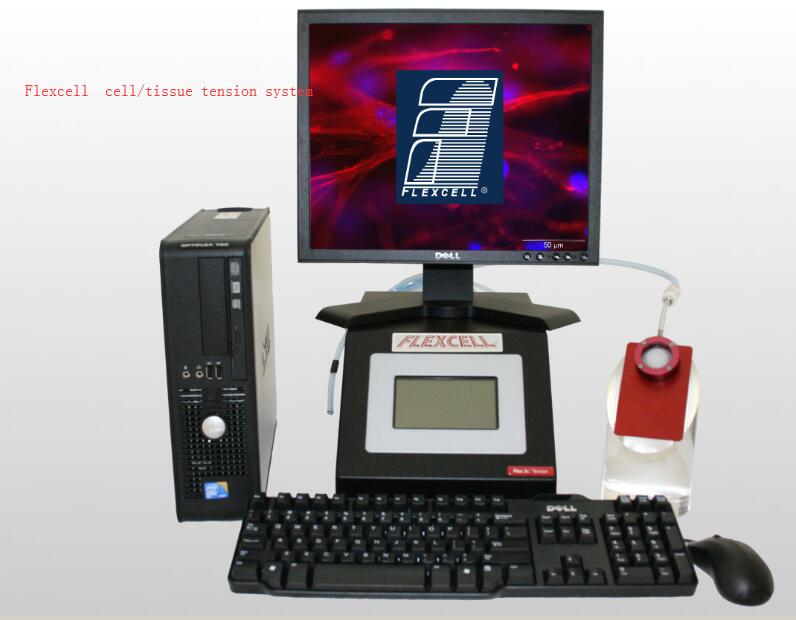
The StageFlexer® is designed to strain cells in monolayer while viewing the cellular activity with an upright microscope.
-
Applies strain to cells in real time using upright microscope stage.
-
Achieve over 14% substrate elongation
-
Consists of a single 35 mm well with a matrix bonded silicone rubber membrane
-
Works with the full range of flexercell® Tension Systems
-
Achieve gradient biaxial strain by freely deforming membrane in open chamber
-
Apply equibiaxial strain to membrane by using a cylindrical loading post in chamber
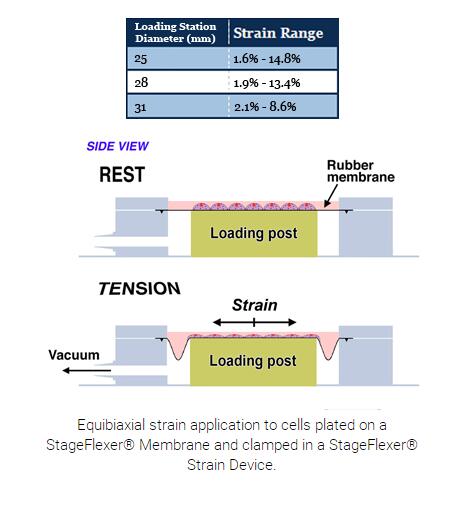
2銆�Inverted StageFlexer® device for inverted microscope
The Inverted StageFlexer® device allows observation cell tension with an inverted microscope
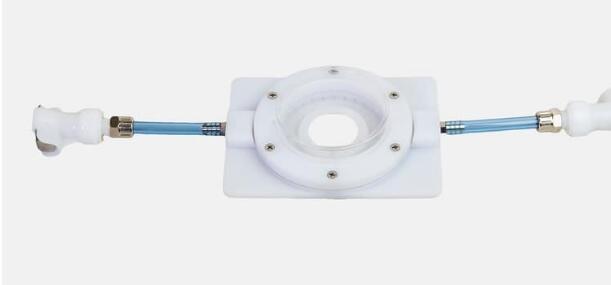
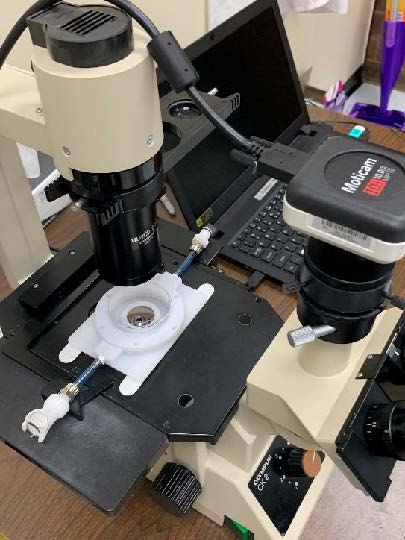

|
















